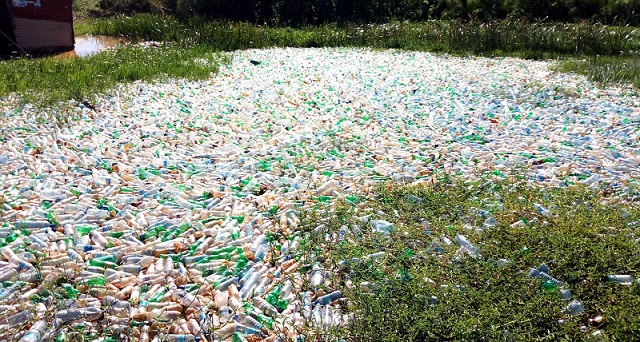
Kampala, Uganda | THE INDEPENDENT | The increased water level in Lake Victoria has exposed widespread poor waste management practices among lake shore communities in Masaka district.
The amount of solid waste material that gets deposited in the lake has come to the surface since various landing sites have been submerged by heavy floods.
At Kachanga, Kaziru and Lambu landing sites in Bukakata sub county in Masaka district, there are huge layers of none-decomposing waste material floating towards the shallow ends of Lake Victoria.
The waste includes plastic and polythene materials, fragments from collapsed houses and stalls that had been set up around the shorelines.
Emmanuel Ssekito, a former resident of Kachanga landing site says the waste materials are carried along by the rain waters flowing into the lake.
According to Ssekito, some of the waste material was carried into the lake from the dumping sites on landing sites that were submerged by floods while some was carried from people’s homes.
He indicates that the communities lack proper waste management systems, explaining that they have been heaping their waste material in open spaces where is not even collected for proper dumping.
Aloysius Jjuuko, the Bukakata sub county LC 3 chairperson argues that some of the plastic materials sighted on Lake was being used by fishermen as floaters on their fishing nets but says its accumulation is unprecedented.
Jjuuko is however optimistic that the floating materials will be deposited in a common place where it will eventually be collected when the lake settles down.
Rose Nakyejjwe, the Masaka District Environment Officer has blamed the contamination of the lake on poor waste management by communities on the landing sites.
She says the district doesn’t have a plan to remove the waste materials on the lake and tasks the sub county leadership to workout out modalities of clearing the floating waste from the waters.
Nakyejjwe has asked local leaders to mobilize fishermen to use their boats to collect the waste material for burning.
Frank Muramuzi, the Executive Director National Association of Professional Environmentalists-NAPE, an action none organization committed to environmental protection, says such none-decomposing waste material generally pause serious threats to the entire ecosystem.
He explains that the material could be deposited into the surrounding environment once the water recedes hence causing serious health risks to the community and long term negative effect on the soils.
****
URN
 The Independent Uganda: You get the Truth we Pay the Price
The Independent Uganda: You get the Truth we Pay the Price





